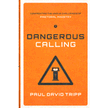Counselors Reflect on Dangerous Calling by Paul Tripp
A Series to Care for the Care Takers of God’s People
“Once you have closed your eyes to the evidence and quit listening to the voices of others, you are left to the blindness and self-righteousness of your yet-sinful heart.” P. 39.
John Wooden, former UCLA basketball coach once said,
“Be more concerned with your character than with your reputation. Your character is what you really are while your reputation is merely what others think you are.”
If we confuse the two then it becomes extraordinarily challenging to live consistently and keep our focus in the true north position. Undoubtedly, the storms of life and ministry will blow through and these storms have the potential to create remarkable havoc in our spirits. Our thriving and, indeed, our survival depends upon where we have built our foundation and what materials we have used. It will either last or it will collapse with great drama. For the pastor or Christian worker this can cause one to question their calling.
When you have determined that the problem is not yourself, then the only cause is the job, the congregation or the chaos of the moment. Tripp writes that closing oneself off from the voices of others makes it challenging to conclude that perhaps you are the problem. In fact, if you don’t consider yourself then your focus will be the problem or the ministry, and this can lead to personal confusion and nagging questions.
How can we serve effectively in our roles as pastors or Christian workers, especially when things get challenging? What are the clues that tell us we need to be concerned? How can we prevent the waves of doubt from enshrouding our call to ministry?
First, we must remain honest and thoroughly authentic before the Lord. When you get on a plane, the flight attendant explains that during cabin depressurization it is important for adults to place the oxygen mask on themselves before attempting to aid others. Why? Because we can quickly be overcome by the changing atmospheric conditions before it’s too late. In other words we will likely be passed out before we can help someone else. That leaves two dead instead of two alive. Listening and applying God’s word is vital to our existence and without honest application we can subtly find our thinking distorted and myopic.
Second, as James instructs us, we must be quick to listen and slow to speak. Not only should we invite people to speak into us, especially our friends, but we must be willing to hear what they have to say. If they see cracks in our character then we can thank them and make changes. It’s one-sided thinking that doesn’t allow us to be prepared for the tumult of life and ministry. Proverbs 17:10 says, “A rebuke goes deeper into a man of understanding than a hundred blows into a fool.” As we mature in our faith, we need to body of Christ more thoroughly.
Finally, if we fail to listen to the voices of others then we can easily find ourselves questioning our calling instead of ourselves. If we leave our calling, we still take the character issues with us. However, if we listen to the evidence and the call of our friends about ourselves, we deepen our calling and engage in a changed and deepening character. The second choice is the best. It brings honor to Christ, the one who called us to ministry in the first place.
God calls us to trust him and to lay our deep insecurities before him. Only he can provide the strength and honesty we need as we serve him.
 Dangerous Calling: Confronting the Unique Challenges of Pastoral Ministry By Paul David Tripp / Crossway Books & Bibles
Dangerous Calling: Confronting the Unique Challenges of Pastoral Ministry By Paul David Tripp / Crossway Books & Bibles